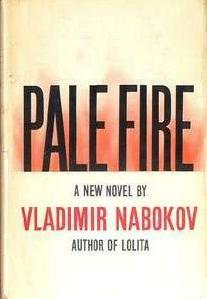Pale Fire

First US edition of Pale Fire
|
|
| Author | Vladimir Nabokov |
|---|---|
| Country | United States |
| Language | English |
| Publisher | G. P. Putnam's Sons |
|
Publication date
|
1962 (corrected edition first published by Vintage International, 1989) |
| Pages | 315 |
| OCLC | 289702 |
Pale Fire is a 1962 novel by Vladimir Nabokov. The novel is presented as a 999-line poem titled "Pale Fire", written by the fictional poet John Shade, with a foreword and lengthy commentary written by Shade's neighbor and academic colleague, Charles Kinbote. Together these elements form a narrative in which both fictional authors are central characters.
Pale Fire has spawned a wide variety of interpretations and a large body of written criticism, which Finnish literary scholar Pekka Tammi estimated in 1995 as more than 80 studies. The Nabokov authority Brian Boyd has called it "Nabokov's most perfect novel", and the critic Harold Bloom called it "the surest demonstration of his own genius ... that remarkable tour de force". It was ranked 53rd on the list of the Modern Library 100 Best Novels and 1st on the American literary critic Larry McCaffery's 20th Century’s Greatest Hits: 100 English-Language Books of Fiction.
Starting with the table of contents, Pale Fire looks like the publication of a 999-line poem in four cantos ("Pale Fire") by the fictional John Shade with a Foreword, extensive Commentary, and Index by his self-appointed editor, Charles Kinbote. Kinbote's Commentary takes the form of notes to various numbered lines of the poem. Here and in the rest of his critical apparatus, Kinbote explicates the poem surprisingly little. Focusing instead on his own concerns, he divulges what proves to be the plot piece by piece, some of which can be connected by following the many cross-references. Espen Aarseth noted that Pale Fire "can be read either unicursally, straight through, or multicursally, jumping between the comments and the poem." Thus although the narration is non-linear and multidimensional, the reader can still choose to read the novel in a linear manner without risking misinterpretation.
...
Wikipedia
